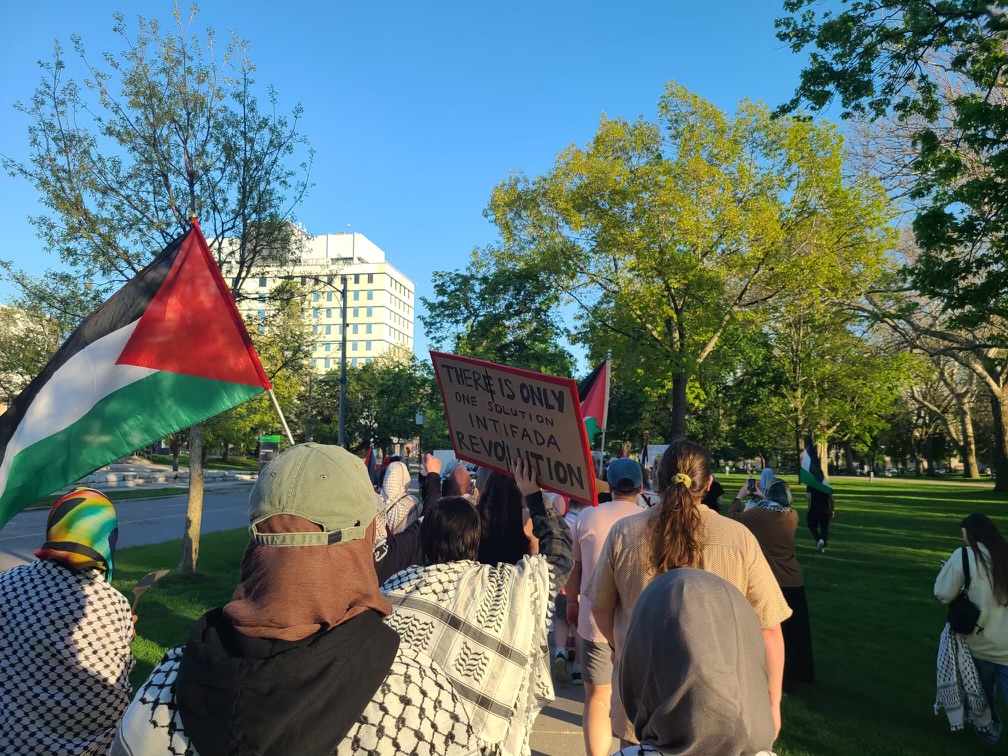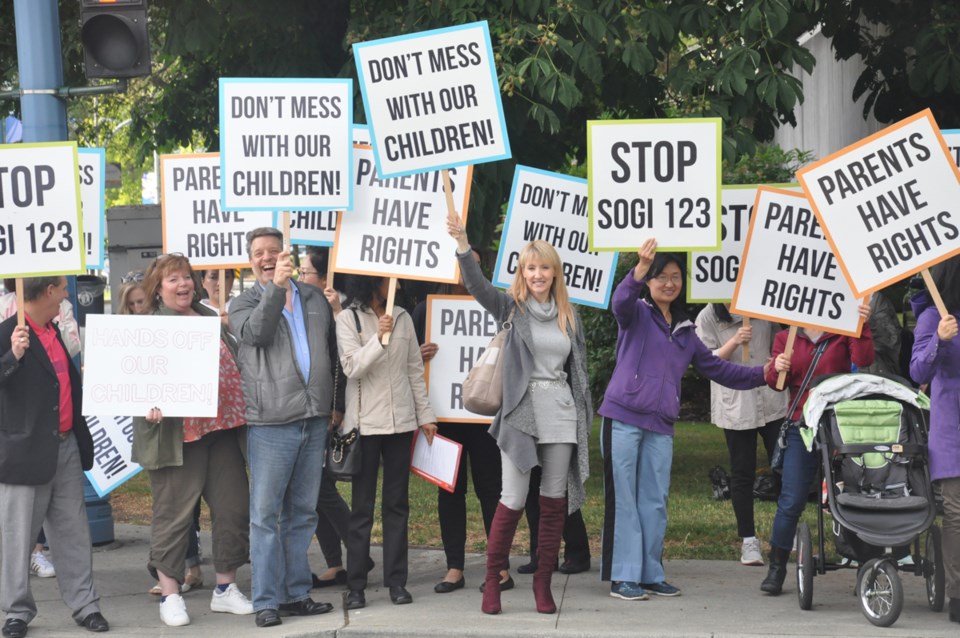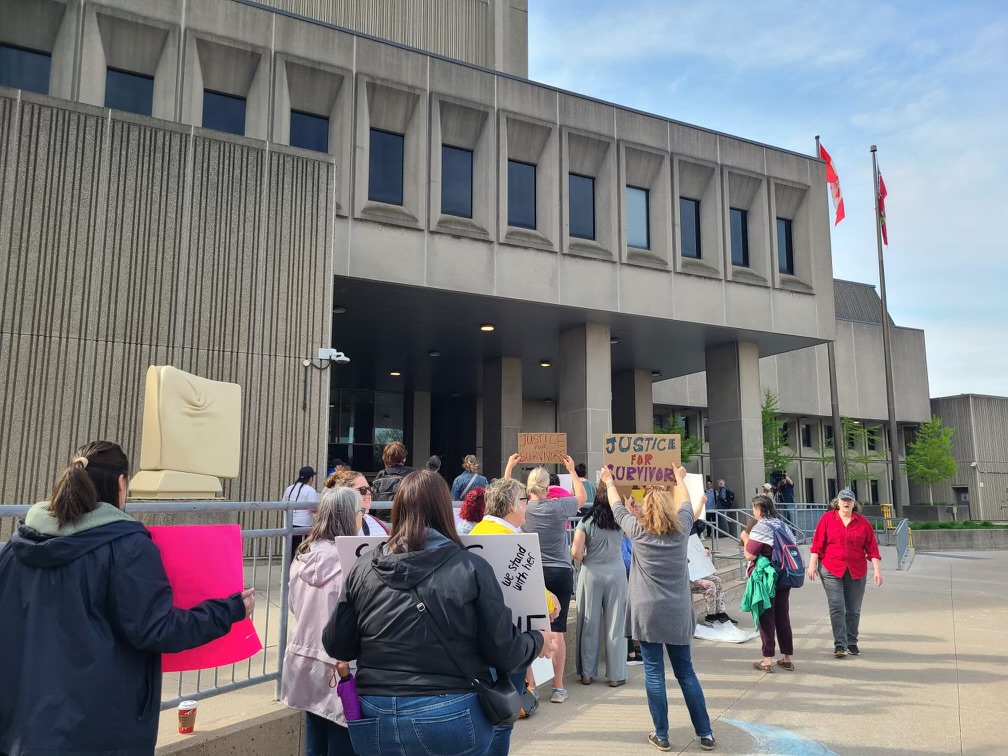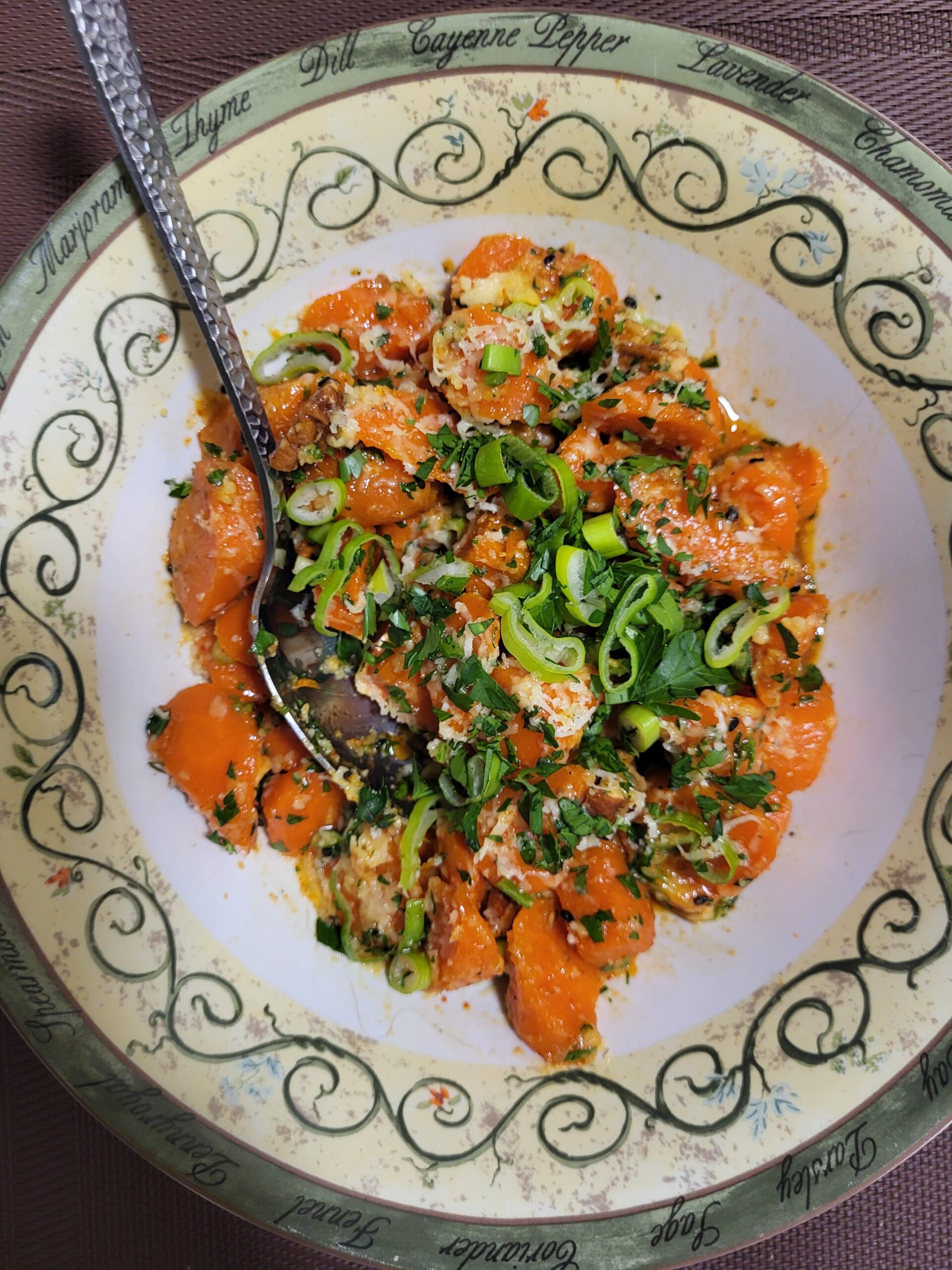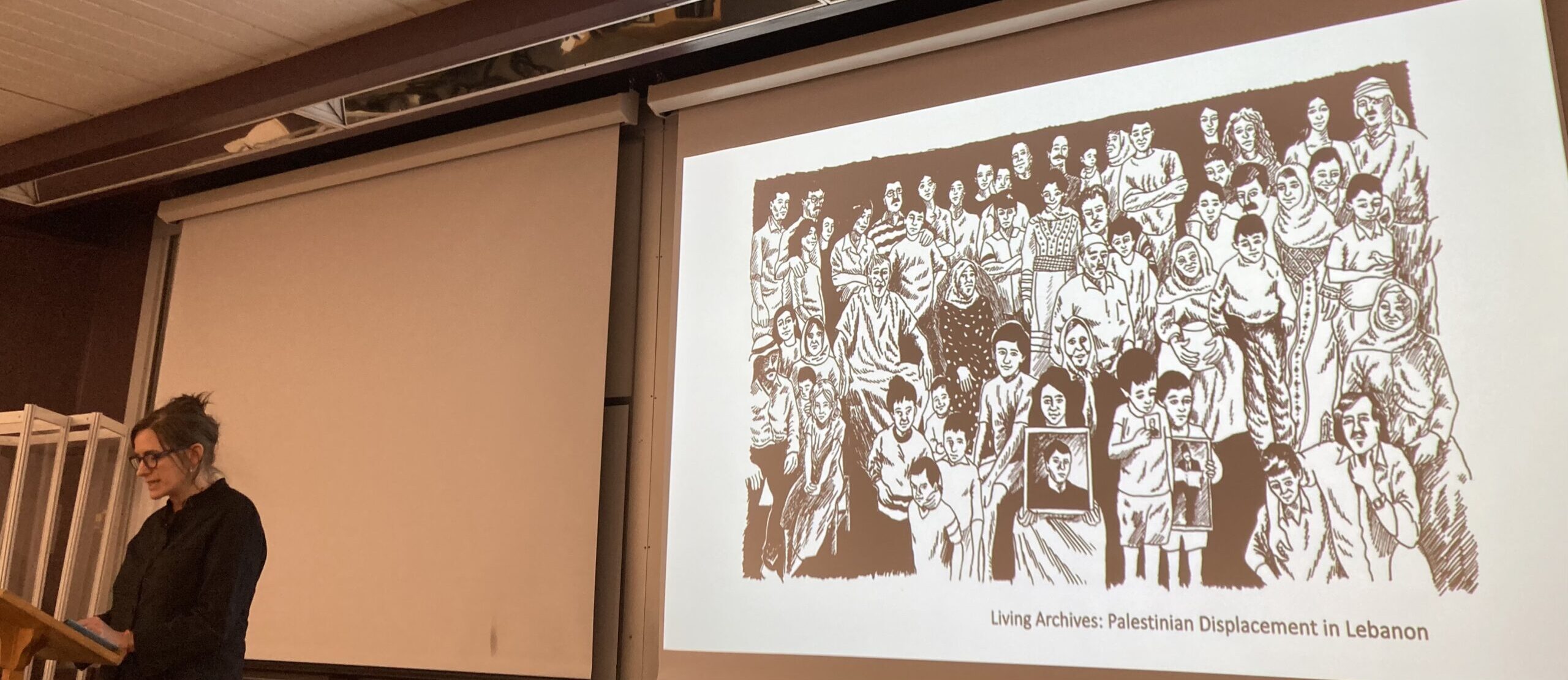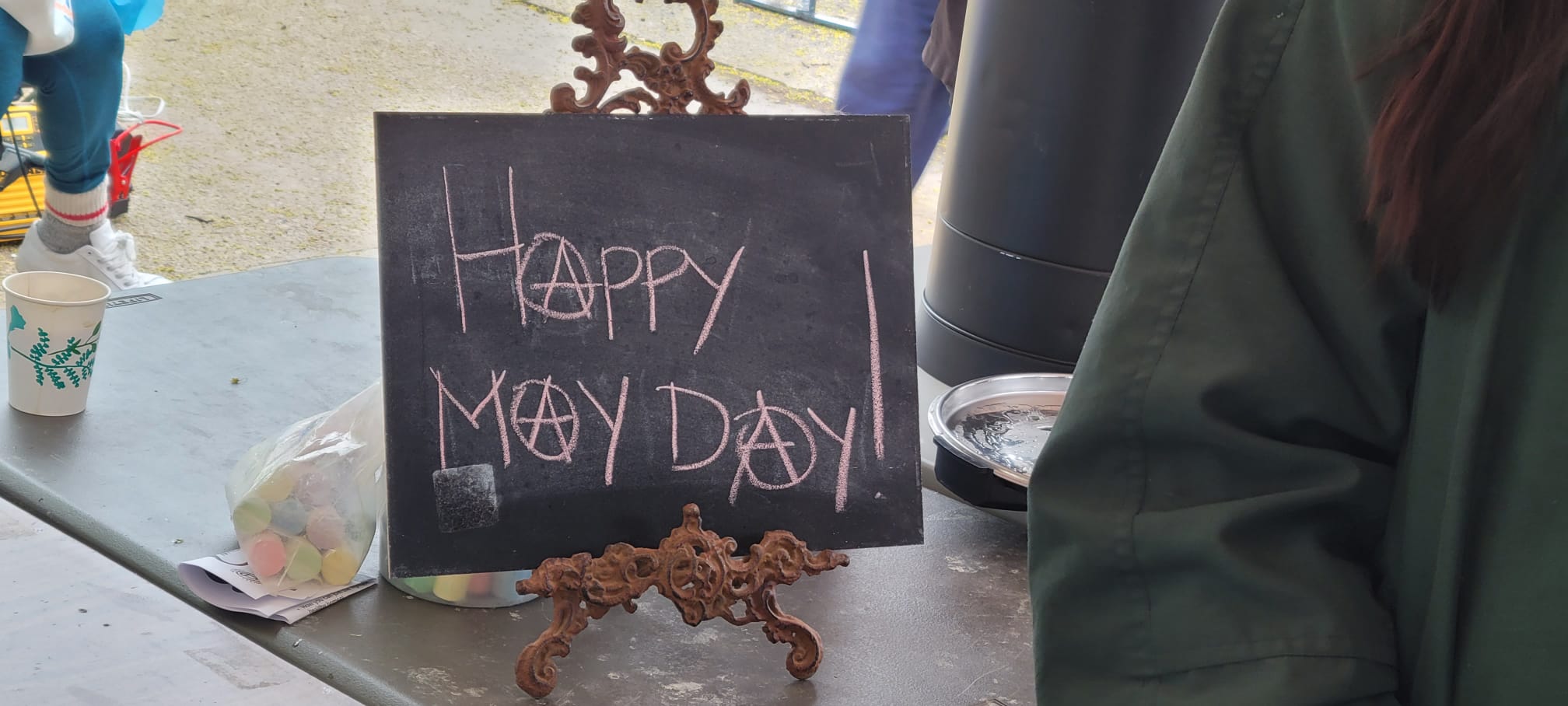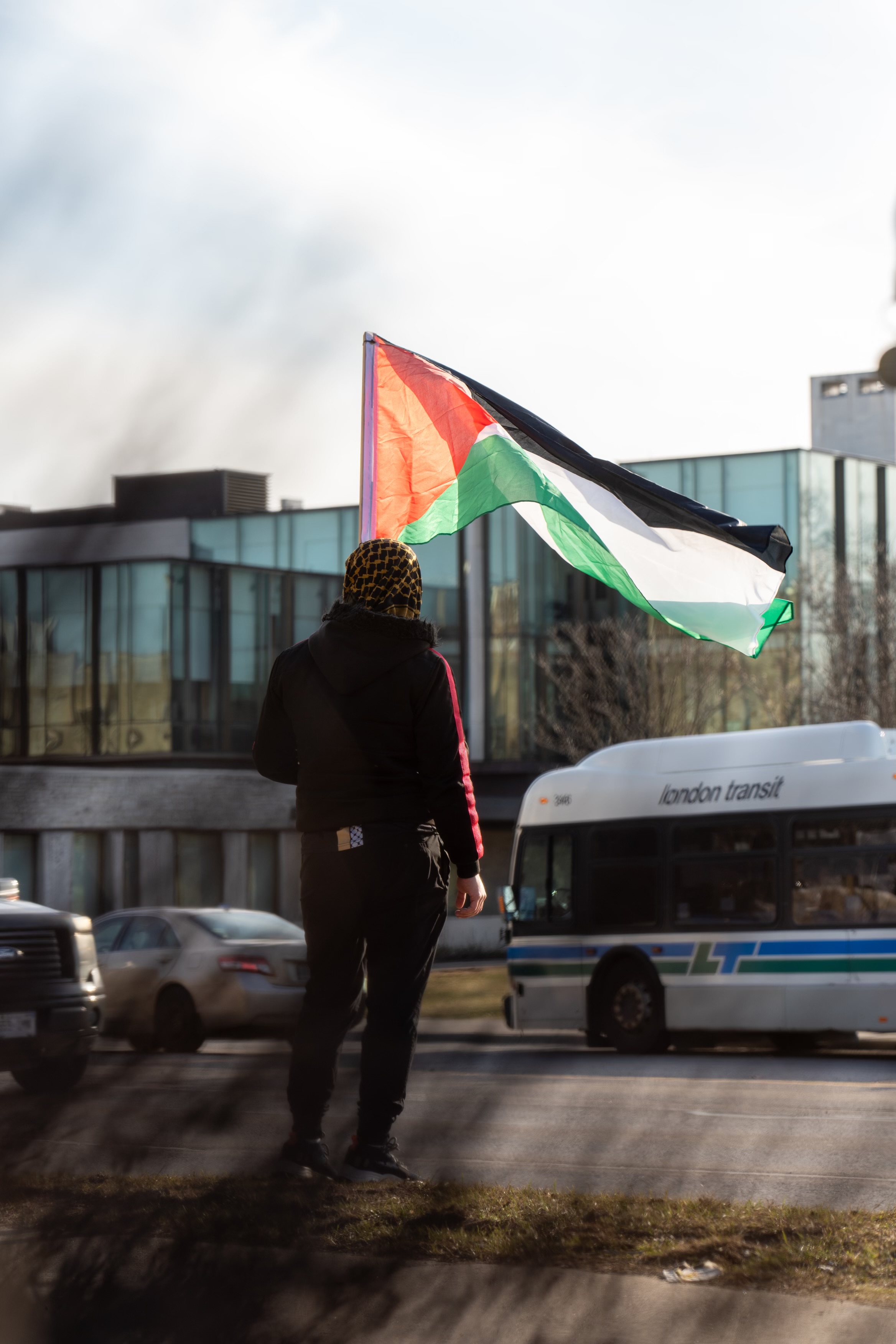‘All of humanity should break out in a fever’: Seven days at Western University’s encampments
Incé Husain
Fri August 23, 2024

Originally published at NB Media Coop on May 24, 2024
Earlier this month, students at Western University in London, Ontario began organizing encampments demanding divestment from companies funding genocide. Western University currently invests $33.6 million in companies complicit in Israel’s violent occupation of Palestine.
The first encampment was on May 1 and ran from noon to midnight; the second was on May 8 and was also planned from noon to midnight, but instead became indefinite from that point onwards. The following is an account of the encampment’s first seven days.
***
“When one part of humanity aches, all of humanity should break out in a fever,” says a Western University alumnus in a speech at the first encampment. “And you are that fever. When you remove the signs of agendas, when you remove economy and politics and money, and you’re really looking at the truth, what’s happening is wrong regardless of how you try to explain it.”
A whiteboard placed at the encampment entrance lists student demands in red.
It demands disclosure: a list of investments tied to Israel and weapon manufacturers. It demands divestment from companies with ties to Israel. It demands that Western University condemn Israel’s illegal occupation and the ongoing genocide in Gaza, which has killed over 35,000 Palestinians – some of whom are family of Western University students.
The whiteboard leads to a tent-filled lawn bordered by Palestinian flags and human rights slogans.
A sign commemorates Gaza’s Al-Azhar University; all universities in Gaza have been destroyed by Israel.
Tents lie across a sun-kissed lawn. Students in keffiyehs talk, read, work, embroider, and eat at picnic tables filled with food donated by the community. A student leads the call to prayer; many cluster in the courtyard, bowing and rising in synchrony.
The first day unfolds in a rhythm of marches, speeches, music, and a continuation of daily routines, like studying or socializing.
Tarek Loubani, a doctor and Western University professor, gives a speech.
“We are here because we honour the babies being killed by Israel through famine,” says Loubani. “We are here because their dry tears, their sorrow, their screams, their quiet deaths, are felt by us, reverberate in us and resonate onto these grounds through us. We are here because we care about humanity and we care about life. Palestinians have always been about life, have always pursued life, have always sought it.”
Sociology professor Jess Notwell enters. She speaks of the uprooting of Palestine’s olive trees and the return of their branches. She speaks of the silencing of youth and the return of their voices.
“Liberation will happen within our lifetime,” says Notwell. “When we stand together in these [encampment] spaces and we share food with each other, and we enact mutual aid, and we take care of each other – that is counter to the genocide all by itself, because what we are saying is that, when we achieve liberation, we will already have the relationships that allow us to live in a world based on love and care so that occupation and settler colonialism and genocide will never happen again.”
The encampment adjourns at midnight.
***
“I have my entire extended family in Gaza,” says nephrology professor Nabil Sultan. “And when I spoke with my cousin a couple months ago, he said, ‘the people around me have completely changed since October 7. People who were weak are now strong; people that had fear now don’t have fear and have courage. People who used to be afraid of death are no longer afraid of death. People live with more purpose and more meaning in their lives.’ As we are setting up our tents, they are in their tents. Know that you stand with the weight of the Palestinian people behind you.”
It is the afternoon of the second encampment on May 8th. Poems of resistance written by students charge the air. Their names are deliberately excluded for their safety.
“Your silence is ignorance, your silence is deadly, your silence is equivalent to the dead, morphed bodies,” recites one student.
“We are fighters who persist in the fight for freedom and life and we will not back down so long as an F-16 remains in the hand of an occupier pointed at a child,” recites another.
“I would feel the warmth in my great grandmother’s lemons as I squeezed, as if I was squeezing her hand, as if it was me by her side when she was giving birth on her way to displacement. And I would say, ‘Don’t worry, it’s not a one way road, we will return to our homes.’ And she would say, ‘I know. Who do you think planted the seeds of hope?’” recites the last.
The second encampment is scheduled to end at midnight. It ebbs beyond, stretching deeper into the night and morning.
***
On day three, Western University’s administration posts a message online.
“Yesterday’s peaceful protest did not end at midnight as planned,” reads the May 9 message addressed to the Western community. “It’s disappointing to see this shift, as our communication with student organizers has been positive and collegial.”
Some students respond to the administration’s message on social media, imitating the letter’s wording.
“It’s disappointing that this institution invests millions into directly killing my family and people,” says one post. “It’s disappointing that 44,000+ people have been murdered. It’s disappointing that 2 million people have been displaced from their homes. It’s disappointing that we’re still talking about the occupation of a patch of grass rather than the 75+ year long occupation of Palestine.”
Western University’s insignia is emblazoned at the top of the site header, the same royal purple as a banner in the University Community Center just outside the encampment. “Students have the power to change the world,” it says.
***
On day four, the encampment holds an open mic.
A student and a member of Independent Jewish Voices London speak of solidarity between Muslims and Jews.
“There is a bridge to build between… Muslims, Jews,” says a student. “It’s there to be built and it’s there to be crossed. We are brothers and sisters.”
A member from Independent Jewish Voices London emphasizes that anti-Zionism is not antisemitism.
“If anyone wants to tell you that anti-Zionism is antisemitic, just send them our way. We’ll have a great time talking with them.”
The night is thick with chai. Students cluster beneath heaters that glow in the dark. A documentary on Palestinian history plays. The courtyard steps hold books about Palestine.
Behind a tent, two girls cry. A dog, panicked by their grief, licks away their tears. Beneath the northern lights, a community member says: “Palestine is like a phoenix; she always rises.”
The people of the encampment march. Streetlights turn the white of the Palestinian flag ghostly. The chants escalate; cars honk in support.
***
“Joy is resistance, period,” says a student on day five. Tatreez rustles in a tent. Stories are shared; laughter is easy.
The peripheries of the encampments flicker with strangers wielding cameras. Students don face masks, sunglasses, turn their faces. The entrance to the tatreez tent is zipped shut.
Twice, campus police enter the encampment to distribute letters.
The letters state that the encampments are violating campus policies. It offers a general list of rules, not stating which were violated by tents on the lawn (see the admin message from May 11).
Encampment attendees immediately grab markers and congregate at picnic tables. The rain pours; the ink runs.
“I’m not reading all that,” one student writes over a letter.
“People are dying,” another writes.
***
“The purpose of pepper spray is to make you panic,” says Loubani on day six. “Do not resist arrest. Be ready for bruises and scrapes.”
A lesson in self-defense and de-arrest tactics unfolds.
A building outside the encampment that said “Weldon Library” is taped over with a poster titled “Ras Abbu Amar,” a Palestinian village wiped from the map by Israeli forces. Other buildings are renamed across campus.
“Everyone pull out your phones and record this,” says a student, preparing to recite the encampment’s demands. “So the administration can’t say we didn’t try to talk to them.”
The student lists divestment demands. The elimination of all partnerships with Israeli organizations, such as the business school’s trip to Ben Gurion University in Israel, which denies entry to Palestinian students holding Palestinian ID cards; the removal of a course called “Israel: People and Culture” in Western University’s history program that “propagates anti-Palestinian and pro-colonialism rhetoric,” labels “75 years of genocide in Palestine a ‘conflict,’” and “normalizes the dispossession and the erasure of Palestinians.”
***
It is day seven. Dogs greet the people of the encampment. CBC reporters fill the peripheries.
NDP MP Matthew Green boldly states his solidarity.
“It is an ethical demand,” says Green of the encampment’s divestment demands. “It is a legal imperative when you look at the International Criminal Court of Justice: all countries, nations, organizations and institutions that may be knowingly engaged in what they are calling a plausible genocide – but we know with our naked eyes and bear witness to is absolutely a genocide in Gaza – have a legal, moral, and ethical obligation to divest.
“You don’t have to have a PhD in international law to know there is no moral cover for what is happening,” he continues. “The contradictions of the West and the way they have dealt with this both internationally, but also through media, show a contradiction in our positions. That needs to end. This is not a religious war; this is a genocide.”
Unfortunately, Western University’s complicity in the genocide does not seem closer to ending. Rather than heed protesters, the university has called the encampment “unlawful and unsafe,” and stated that “now is the time for it to end.”
The struggle continues.
